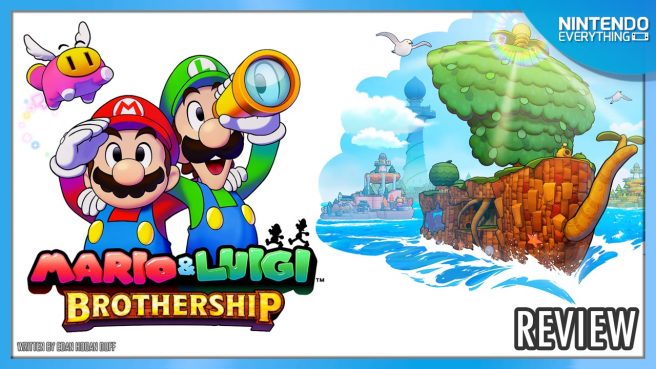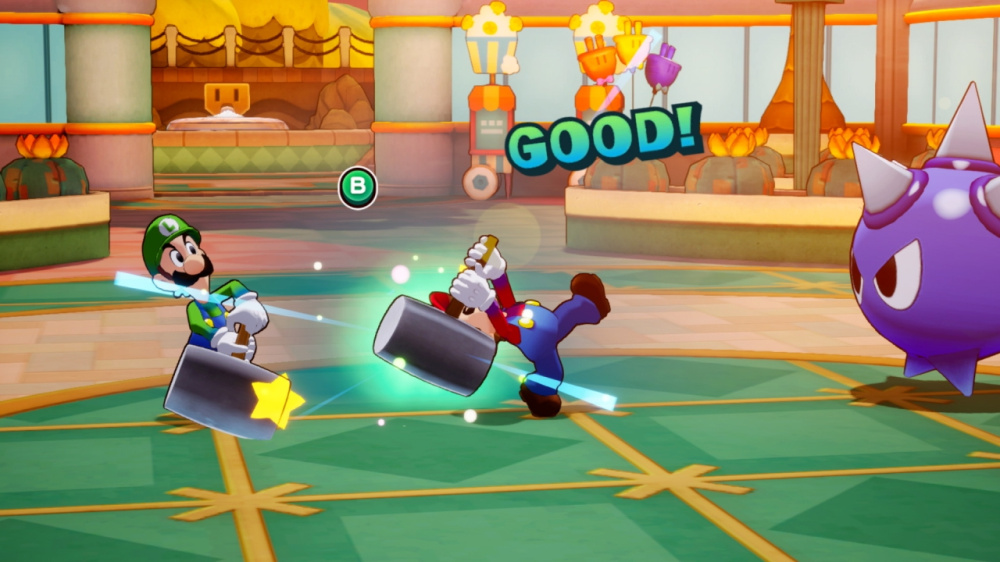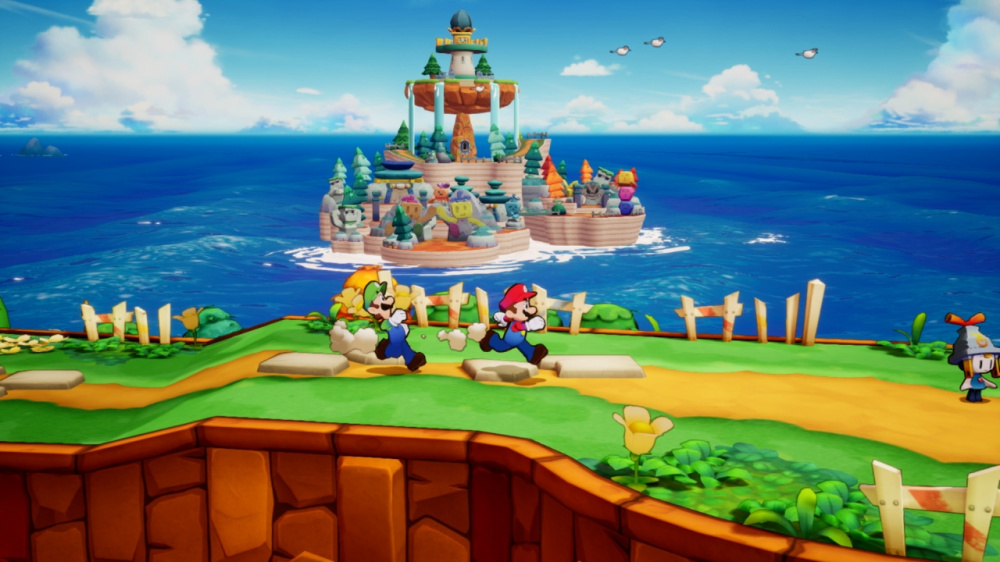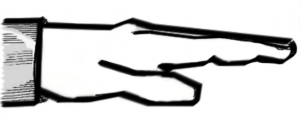Mario & Luigi: Brothership review for Nintendo Switch
System: Switch
Release date: November 8, 2024
Developer: Nintendo
Publisher: Acquire / Nintendo
The last year or so has been a remarkable year for RPGs, especially ones with “Mario” in the title. We’ve already been graced with lavishly produced remakes of both Super Mario RPG and Paper Mario: The Thousand-Year Door – and now, Nintendo is closing out the year with a brand new, wholly original RPG in the form of Mario & Luigi: Brothership. The Mario & Luigi series was originally helmed by Alphadream before their unfortunate closure in 2019, for Brothership, Nintendo has tapped Way of the Samurai and Tenchu developer Acquire to carry the torch forward. While the franchise’s new stewards have done an admirable job adhering to the series’ identity, some considerable missteps prevent the latest Mario & Luigi entry from reaching the lofty heights of its predecessors.
For the unfamiliar, the Mario & Luigi series’ core appeal has always been how it livens up traditional turn-based RPG principles by mixing its combat with timed rhythm-action elements, and its overworld with unique puzzle-platform gameplay. Clever writing and a knowing sense of humor have also furnished the subseries with a broader appeal than its initial, kiddy design language would suggest. Once you boot up Brothership, it’s wholly evident that Acquire has studied the source material intensely, and has done everything it can to tick those boxes in earnest – with mixed results.
The setup this time around is that Mario, his terrified brother, and a who’s who of Mushroom Kingdom residents have found themselves stranded in Concordia, a blisteringly colorful utopia fractured by the cataclysmic destruction of a big huge tree known as the “Uni-Tree”. The inhabitants of this world need Mario and Luigi’s help to reconnect – both figuratively, and physically. You’ll do this across the game’s 30-ish hour runtime by essentially building out a glorified Local Area Network between fractured islands adrift in the ocean, allowing all of this world’s cute little pals to freely hop between each isolated landmass.
Brothership’s themes of reconnection and historical ties are genuine and warm, however, the writing tends to err on the side of repetition a little too frequently. You’re reminded about Concordia’s dire circumstances during almost every cutscene and every conversation with its inhabitants. Throughout the latter half of the game, there are somber moments that, paired with Brothership’s excellent score, have the potential to amplify the themes in a meaningful and resonant way. Unfortunately, these moments are ultimately spoiled by the game’s unending need to treat you like you have the attention span of a household fridge. This lack of trust in the player’s intellect also translates to the overworld. Previous Mario & Luigi games have allowed you to freely explore the world and control each brother independently as the need arises but in Brothership, Luigi essentially exists as an accessory that you can contextually command with the L button. More often than not, you’ll solve puzzles by moving to a specific spot in the world, activating Luigi, and then passively watching him do the legwork for you. There are still some cleverly designed headscratchers for you to work through, but the unique dual-protagonist approach has been toned down significantly in this game.
Thankfully, Brothership’s combat retains just about everything the series has been renowned for over the last two decades. Turn-based at its core, yet tactile in its execution, it’s a wonder what the addition of timed button presses can do to a simplified move-set. As with past entries, you independently manage both Mario and Luigi with the A and B buttons, executing attacks, combos, and counters in sync with your enemy’s actions. You’ll do more damage and extend the length of your attack sequences by hitting the onscreen prompts at just the right moment. The accompanying animation work in Brothership is generally great, and the bouncy, flowing fluidity of a well-timed combo attack never loses its appeal.
You can upgrade the brothers by purchasing new gear at vendors or by receiving it in kind for a good deed done. With that said, those deeds can sometimes feel a little underbaked – there’s quite a bit of “go here, get this, come back and I’ll remind you why we’re all here and give you some new pants”. It’s a relief that even if the task at hand is uninspired, you can still look forward to some fast and active turn-based scraps to sink your teeth into. Adding the new “Battle Plug” system also lends a bit of creative energy to your builds. These special items can be crafted in-game and earned as the story progresses, and they power up your move-set with added abilities that go a long toward keeping bouts fresh and engaging.
The enemies you’ll encounter across the span of your time in Concordia are a creative and timeless-looking bunch. These nasties could easily slot into Super Mario annals of infamy, and wouldn’t look out of place next to Bowser or Dry Bones. The same can’t quite be said of the world, however. Concordia is a vibrant place to explore for sure, but it feels lacking in identity next to other recent Mario RPGs. The feeling that you’ve seen it all before creeps in gradually, as you sail the seas and launch yourself to each new island. The addition of a few artistic curveballs would have gone a long way toward relieving some of that fatigue. Compounding this slightly tired artistic angle is the technical cocoon within which Brothership resides – this is an Unreal Engine 4 game. Epic’s storied game engine has seen mixed results on Nintendo Switch at the best of times, and the pitfalls that UE4 games tend to fall foul of are readily apparent throughout this adventure. Poor texture filtering and a woefully inconsistent framerate feel totally at odds with a typical Mario experience on Switch, which only makes the shortcomings stick out even more. It would have been preferable to see Nintendo’s in-house technology utilized for a key first-party release such as this.
The Verdict
Ultimately, Brothership never quite shakes the nagging sense that the Mario & Luigi series’ best days are behind it. Hopefully, the shortcomings that land the game firmly in “good but not great” territory are rectified as Acquire acclimates to the series in the long run – whether the team is given a second shot at the franchise remains to be seen. Next to the unequivocal significance of Super Mario RPG and Paper Mario: Thousand Year Door, Mario & Luigi: Brothership feels like a well-intentioned yet inconsequential footnote.
Mario & Luigi: Brothership copy provided by the publisher for the purposes of this review.



